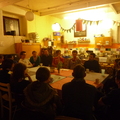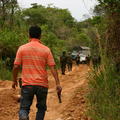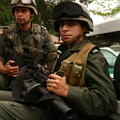BP in Colombia
Tagged as: bp colombia oil social_strugglesNeighbourhoods: colombia
Claire and Bruno have been in Colombia helping build grassroots community groups. Claire is from Espacio Bristol-Colombia and has been living in Colombia for a year and is going back soon and Bruno came over as a repsentative for the community to speak at the BP AGM. They are on a UK on a speaking/ workshop tour to build links with groups who could help in the global fight against the oil industry. They came to the Common Place and explained what has been happening there, followed by Q&A.



Click on a thumbnail for a slideshow view
Casanare found oil in late 80's. Initially the people were happy as they thought they'd be rich The main work in the region was livestock farming and agriculture. However the oil business has destroyed the prospect of farming as it ruins the regions water supply. Pumping the oil out of the ground requires an equal amount of water to be pumped under-ground to keep the pressure up, and oil exploration is done via examining the shockwaves created by dynamite explosions; but these explosions crack the impermeable layer and so under water aquifers literally disappear.
One of BP's first moves was to employ an ex-Israeli army chief to oversee security. He trained up local mercenaries to provide security. BP generally keeps themselves at arms length in the country through getting subcontractors to do the employing. This stops them being directly accountable.
Colombia has been going through a 60 year civil war. The latest government came in with a strong mandate to end with the guerrila with a militrary solution. To "prove" they are winning, soldiers are paid around a £1000 bonus for killing a guerilla to get the statistics up. But it is easier to kill poor people, both rural and urban, and then dress them up as a guerilla. This helps the government as social work is weakened and oppostion to the current regime is weakened. The soldiers are protected by the state. This isn't too far removed from how UK police force deals with deaths in custody or dawn raids on Muslim communities, protecting the state apparatus and scaring groups into silence.
In the Casanare region there has been 2,600 people disappeared, 6 400 killed with a total population of 300 000. People have been trying to organise for years but every time they have spoken out against BP, leaders have been killed. On 21st of Jan 2010 one groups of contractors, Sar Energy, rebelled. Soon all the other contractors joined in. Then the local people who's livelihood had been ruined joined in the protest. The transport workers, who had no grips with BP, joined in out of solidarity to the community and the local business' joined in to protest that BP was buying from outside of the region. On the 21st the groups came together and like a spark in a petrol station (warning this is a link to You Tube who may be logging your IP address) they organised 18 blockades of BP.
BP said it was unwilling to negotiate under pressure and used helicopter to transport workers. After a while ran out of infrastructure and agreed to negotiation. The time when they were not in direct protests with BP has been spent trying to understand what all the different groups in the community wanted for their region, and what they wanted to demand: respect for life, for the environment, for local businesses and for more of the oil wealth be used to end poverty in the region. Just last week, BP responded saying no way are they going to negotiate, instead they are going to sue the communities for slander. The community is deciding what action to take next.
The groups want to have a say over BP's operations. Because of the destruction of the social organisations in the region, there is long work ahead to begin to collectively figure out what they want for their region. Being on the sharp end of the oil industry it is hard to question the whole machinery so the campaigners have been trying to make links with the Canada Tar sands movement and over places that BP is involved in to share stories, experiences and join struggles
Links:
Espacio Bristol-Colombia is a collective of people based in Bristol (England) and beyond, who are working in solidarity with Colombian social activists, communities and human rights defenders, who face threats, murder and imprisonment as a result of their struggles for another possible world. We are part of the Red de Hermandad y Solidaridad con Colombia (Network of Solidarity with Colombia).







upcoming events on colombia
Claire and Bruno will be taking part in a conversation about oil, violence and resistance in manchester on Wednesday 21st
https://www.indymedia.org.uk/en/2010/04/449208.html
Claire will be speaking in Edinburgh(25th) and West Kilbride (28th) making links with communities resisting coal extraction and expanision in Scotland and Colombia
www.indymediascotland.org/node/18956